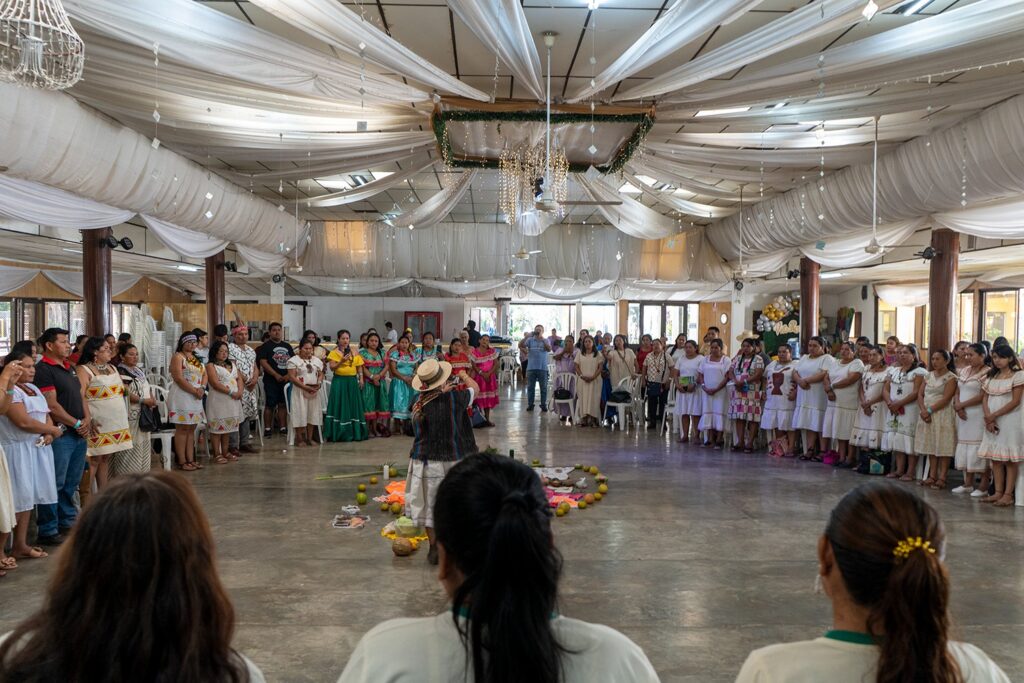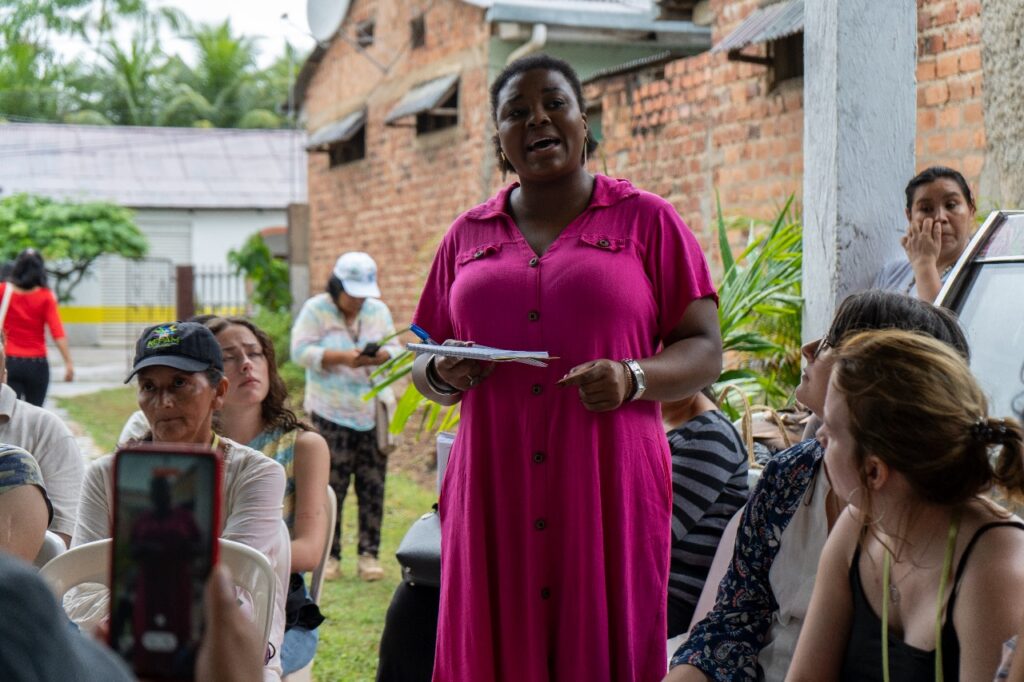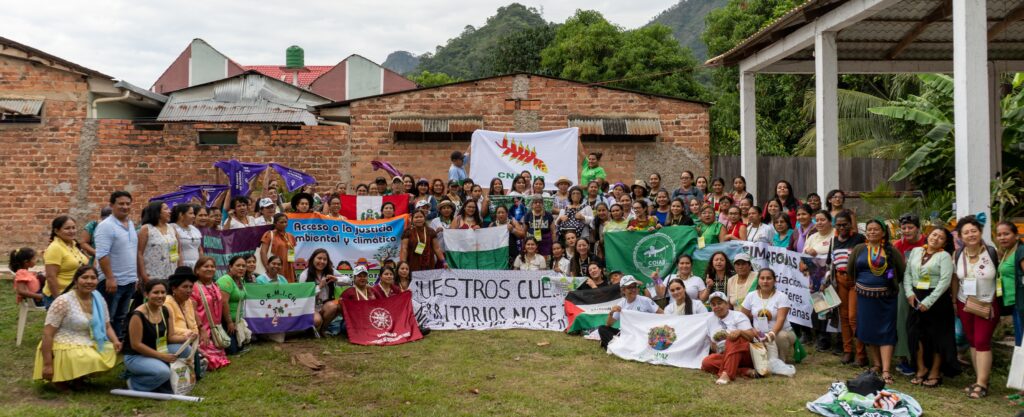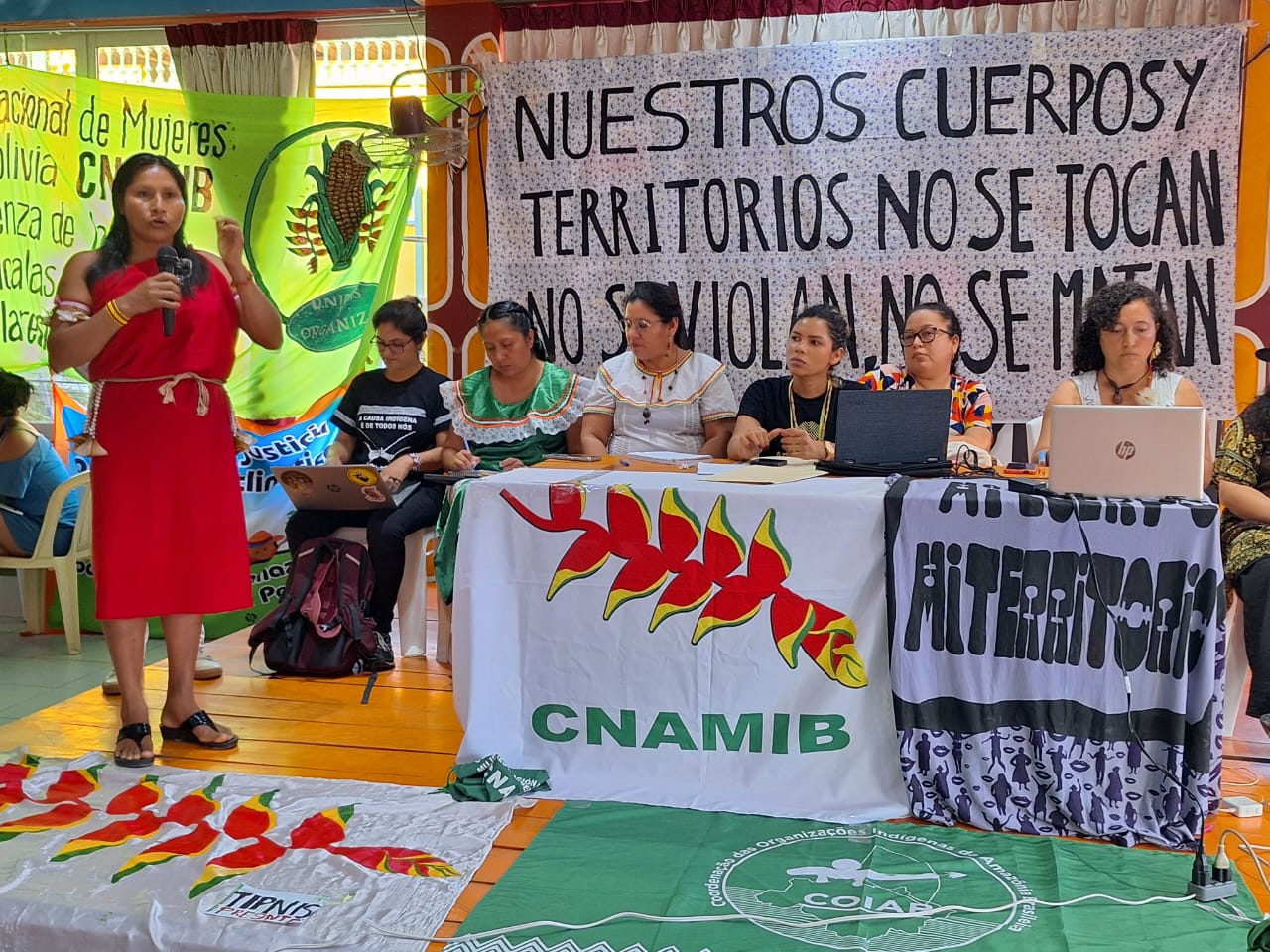The Women's House of Resistance is a space created within the Pan-Amazonian Social Forum (FOSPA) where Amazonian and Andean Indigenous women, Black women, Quilombola women, lesbians, trans women, youth, feminists, ecofeminists, and environmental and human rights activists from various territories of the Pan-Amazon come together. This diverse articulation centered its dialogues on two main themes: territory and women's participation; and violence and rights. Additionally, the Ethical and Political Tribunal in Defense of the Body and Territory of Amazonian and Andean Indigenous Women was once again held.
The action initiatives form a fabric that integrates the diversity that characterizes Amazonian peoples and enhances their capacity to drive changes towards living well with nature. One of these initiatives advocates for the defense of women’s bodies and territories. This effort has been ongoing since the IX Pan-Amazonian Social Forum in Mocoa (Colombia) and the X FOSPA in Belém do Pará (Brazil), and it was consolidated in the eleventh meeting held in Rurrenabaque and San Buenaventura (Bolivia). In this edition, the slogan “Our bodies and territories are not to be touched, violated, or killed” resonated deeply with the women and men participating in the forum.
Bolivian Indigenous women’s organizations have highlighted the problems they face in their territories and the specific impacts on their bodies. These realities are common to women in other countries, whether they come from rural or urban settings, mountains or plains, arid regions or forests. The interaction in the dialogue spaces shows the importance of sustaining various forms of resistance and articulation against patriarchy, racism, and new colonialisms that exploit the resources nature provides.
Human rights are interdependent and intersecting. Therefore, it is crucial for the processes of the Pan-Amazonian Social Forum to recognize the multiple and diverse agendas of women from all Amazonian territories. These agendas must be addressed in a specific and transversal manner from the perspectives that drive their struggles: to end the web of oppression that seeks to control their lives and territories.

The struggle against territorial dispossession and for autonomy over their bodies
A common theme in the women’s testimonies is the continuum of violence in their lives, discrimination within their own communities, and obstacles to developing their leadership and becoming full citizens with the autonomy to make decisions about their own lives. Another intersecting factor in their experiences is the threat and predatory action on their territories due to the presence of extractivist activities, both of which carried out with the approval of current governments and those operating illegally.
“We are in a difficult moment for the Pan-Amazon region. We are facing extractivist policies in all our countries, and that is why we are here to defend it. We will continue to open and weave pathways,” declared Wilma Mendoza, president of the National Confederation of Indigenous Women of Bolivia (CNAMIB), during the inauguration of the dialogue space of the Women’s Resistance axis.
The community fabric weakens, creating conditions that exacerbate violence against women, including human trafficking and sexual exploitation, disappearances, femicides, rapes, forced pregnancies of girls and adolescents, and imposed motherhood.
Bolivian women leaders also denounced the corruption of male leaders in their communities, who prioritize their personal interests over the common good.
Mendoza described the grave situation faced by Indigenous peoples in general and women in particular, who, in addition to racial and class discrimination, also experience gender inequality and need to establish alliances to find common pathways. In Bolivia, women and Indigenous peoples are dispossessed of their territories through various strategies. Bolivian women leaders also denounced the corruption of male leaders in their communities, who prioritize their personal interests over the common good.
Another problem is the state’s neglect of Indigenous peoples’ demands for territorial demarcation, ongoing grievances that continue to go unheard, thereby favoring the presence of outsiders who occupy and devastate the land. This situation brings customs and practices foreign to the values, beliefs, and cultures of Indigenous peoples. In this context, the community fabric weakens, creating conditions that exacerbate violence against women, including human trafficking and sexual exploitation, disappearances, femicides, rapes, forced pregnancies of girls and adolescents, and imposed motherhood.

Religious fundamentalism and women’s rights
Among the main issues faced by women in various Amazonian territories is loss of land, which exposes their communities to greater food insecurity. Responsible for traditional roles in household and family care, and criminalized for defending their rights and nature, women are driven through displacement and forced migration to other locations.
As these events occur in countries with elected governments, whether progressive or conservative, women’s delegations question the quality of democracies in the Pan-Amazon region, which, through action or omission (if not outright promotion), endorse systematic violations of the rights of Indigenous, peasant, Afro-descendant peoples, and women.
The personal religious beliefs of ultra-religious groups have managed to influence political decision-making spaces in countries like Peru and Brazil. These movements are driving a regressive wave concerning human rights in general, and the rights of women, girls, and adolescents in particular.
Ultra-religious groups are driving a regressive wave concerning human rights in general, and the rights of women, girls, and adolescents in particular.
This reflection on the violation of rights is linked to the presence of religious fundamentalism that opposes the recognition of women’s rights, especially those related to the body, sexuality, and reproduction. Unfortunately, the personal religious beliefs of ultra-religious groups have managed to influence political decision-making spaces in countries like Peru and Brazil. These movements are driving a regressive wave concerning human rights in general, and the rights of women, girls, and adolescents in particular.
“We have governments responsible for the deforestation, devastation of our Amazon, and the increase in violence against our bodies and territories,” was a comment echoed by women leaders from Brazil, Bolivia, Colombia, Ecuador, and Peru. They also agreed on the urgent need for women’s organizations to strengthen their struggles and alliances in response to this context.

When Women speak
Another issue highlighted by Amazonian women is the loss of natural resources. This applies particularly to the lack of potable water due to river contamination from mercury or oil, mining activities, and the climate crisis which causes droughts or frosts that exacerbate the impoverishment of rural, indigenous, Amazonian, and Andean populations. Currently, all governments promote extractive activities.
The ones bearing the brunt of this situation are women, women who have to walk greater distances to obtain clean water and healthy food, or who must ensure their animals do not get sick or die. River contamination from mining and oil activities poses a threat to the health and survival of Indigenous communities. Although this issue could be addressed by the States, there has been no response.
There was discussion about ancestries and women’s knowledge of health care through herbal medicine, which is not recognized as an effective natural pharmacy for solving health problems in areas where conventional health care does not reach.
There was discussion about ancestries and women’s knowledge of health care through herbal medicine, which is not recognized as an effective natural pharmacy for solving health problem.
Regarding the quality of democracy in Amazonian countries, women’s participation in decision-making spaces within their communities is limited, and even more so at the national level. Decisions are often made on their behalf without consultation, such as the authorization of extractive projects that do not consider the gender-specific impacts on women. There is clear discontent and rejection of the practices of male leaderships that bring more poverty and dispossession to their territories.
Additionally, there was discussion about ancestries and women’s knowledge of health care through herbal medicine, which is not recognized as an effective natural pharmacy for solving health problems in areas where conventional health care does not reach. Midwives shared their experiences and their demand for intercultural health policies that respect women’s knowledge.

Between art and resistance
The dialogue space on Women’s Resistance also served as a meeting point for wisdom, creation, and art, expressed in beautiful earrings, dresses, and necklaces made by hands from different territories. The crafts made from seeds and fabrics were complemented by sustainable productive ventures, including cacao and coffee, beauty products such as soaps, shampoos, creams, and herbal tinctures as well.
The declaration read at the forum’s closing and approved in the plenary stated: “Pan-Amazonian women are at the forefront of the struggle and defense for the sovereignty of our bodies, Mother Nature, and territories. We stand against the oppressions of patriarchy, colonialism, capitalism, and extractivism. We denounce global geopolitical domination sustained by political, economic, and religious fundamentalism that marginalizes us and imposes lifestyles on us.”
Additionally, Amazonian and Andean women condemned the constant disrespect for their human rights, autonomy, self-governance, and ancestries, under a supposed democratic framework that discriminates and violates them. The declaration highlighted the need to unite in the fight to transform various situations of oppression and promote truly inclusive democracies that respect their leadership styles and community processes.
Thus, the women of the Amazon and Andean regions renewed their commitment to an alliance that strengthens them in their struggles and allows them to continue weaving the community fabric in each territory.

An ethical tribunal in defense of women’s bodies and territories
The International Ethical and Political Tribunal is a symbolic trial designed to highlight the plight of Indigenous women in the Pan-Amazon region within extractivist and colonial contexts. As they resist land dispossession, patriarchy has normalized the subordination of women, treating them as rights-deprived, voiceless subjects, and relegating them to the role of cheap labour providers.
During the XI FOSPA, seven cases were presented to the Ethical and Political Tribunal: two from Bolivia, two from Peru, one from Brazil, one from Colombia, and one from Ecuador. All cases were related to the impacts of violence on women’s bodies, with six of them linked to extractivism. A case from Peru revealed systematic sexual violence against girls and adolescents in the province of Condorcanqui, which was particularly shocking due to the extent of impunity involved.
The path to well-being for Amazonian and Andean peoples relies on relationships of equality and respect between women and men, and between humans and nature as entities with rights.
The Ethical and Political Tribunal questioned the role of states in violating rights and called for urgent action to implement measures for care, accountability, and reparations. It also concluded that structural and historical discrimination poses a threat to ancestral territories and women’s bodies. The path to well-being for Amazonian and Andean peoples relies on relationships of equality and respect between women and men, and between humans and nature as entities with rights.
The ruling represents a form of symbolic justice for the women who testified about emblematic cases of rights violations throughout the Amazon. The persistent violence in their lives cannot be addressed without the commitment of mixed organizations, Apus, and institutions working in the territory. It is crucial to recognize that inequality and social injustices often manifest through the experiences of women, and addressing these injustices becomes a priority for creating a better world.
Denisse Chávez is a member of the Women and Climate Change Steering Group (GIMCC).
Mariela Jara is a member of the Flora Tristán Center for Peruvian Women.
